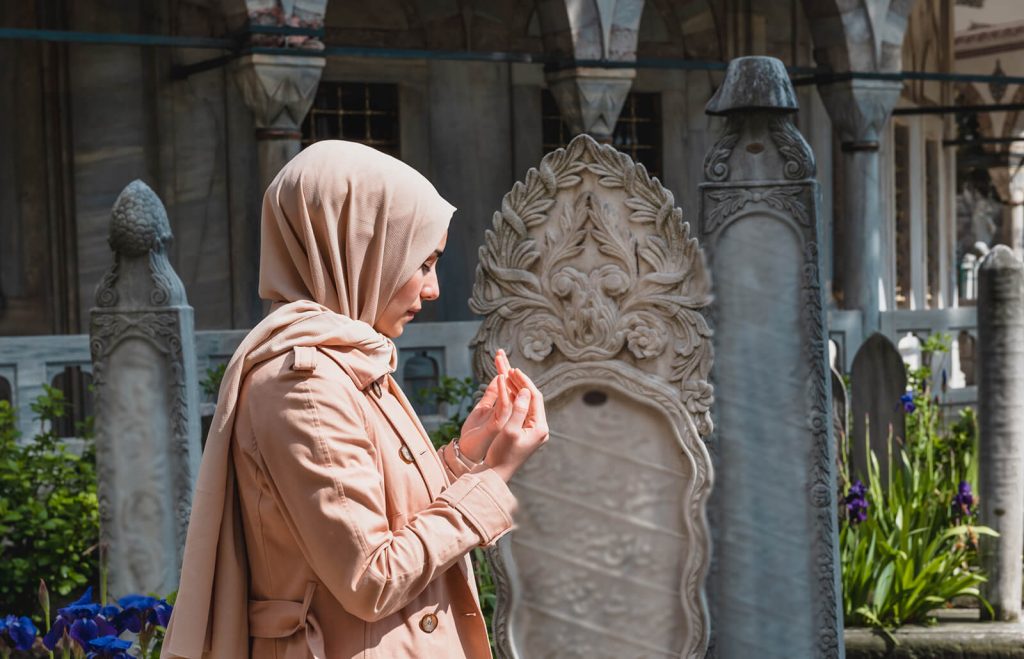Mourning Periods and Practices in Islam
6 min read
Losing a loved one is undeniably one of life’s most difficult experiences, leaving us grappling with overwhelming emotions and an unfillable void in our hearts. In times like these, it becomes crucial to find solace in our faith and seek guidance from the teachings of Islam.
In this article, we will learn the concept of grief and bereavement in Islam, exploring different mourning periods and practices that are observed within the Islamic community. We will also highlight the importance of support from our fellow believers during these challenging times and discover how coping with grief can be approached through an Islamic lens.
Concept of Grief and Bereavement in Islam
The concept of grief and bereavement holds great significance in Islam. When a loved one passes away, Muslims experience a deep sense of loss and sadness. Grief is seen as a natural response to death, allowing individuals to process their emotions and come to terms with the reality of the loss.
In Islam, it is encouraged for individuals to express their grief openly but within certain boundaries set by religious teachings. Crying, mourning, and even wailing are not prohibited during this time. However, excessive displays of grief or engaging in practices that go against Islamic principles are discouraged.
Bereavement in Islam also emphasizes the importance of seeking solace and comfort through prayer and supplication to Allah (SWT). Turning to God for strength helps Muslims navigate through the difficult journey of grieving. Trusting in His divine wisdom brings peace amidst pain.
Islam offers guidance on how long a mourning period should last depending on the relationship between the deceased individual and those left behind. For instance, when losing immediate family members like parents or spouses, there is an extended mourning period known as iddah which lasts for several months.
During this period, individuals refrain from participating in social gatherings or celebrations out of respect for their deceased loved ones. The iddah serves as a time for reflection, self-care, remembrance prayers (du’a), recitation of Qur’an verses dedicated to seeking mercy for the departed soul.
Different Mourning Periods and Practices in Islam
In Islam, mourning periods and practices are observed to honor the loss of a loved one. Every Muslim is encouraged to recite the words of inna lillahi wa inallah-e-raji’oon to seek reward from Allah. These rituals vary depending on cultural traditions and personal preferences, but they all share the common goal of providing solace and support during a difficult time.
One of the most recognized mourning periods is called “iddah,” which applies specifically to widows. This period lasts for four months and ten days, during which the widow is expected to refrain from remarrying or engaging in social activities. It serves as a time for reflection, healing, and adjustment to life without their spouse.
Another important practice is attending funeral prayers (salat al-janazah). These prayers are offered collectively by Muslims after someone has passed away. The community comes together to offer condolences, express their grief, and seek blessings for the deceased. It provides comfort knowing that others share in their sorrow.
It is common for family members and close friends to gather at the home of the bereaved. They offer emotional support through shared meals (known as “khatam”), recitation of religious texts such as Quranic verses or supplications (“dua”), and engaging in conversations about fond memories of the deceased.
The importance of community support cannot be overstated during these challenging times. Muslim communities often rally around those who have lost loved ones by offering condolences through visits or phone calls, preparing meals for grieving families (“food circles”), or organizing prayer gatherings at mosques where people can come together to pray collectively for both forgiveness and strength.
The Importance of Community Support during Mourning
When a loved one passes away, the weight of grief can feel overwhelming. In these difficult times, having a strong support system becomes crucial for healing and finding solace. This is where the importance of community support shines through.
In Islam, the concept of Ummah encourages believers to come together as a community and support each other in times of need. During mourning periods, this sense of unity becomes even more significant. The presence and compassion shown by friends, family members, and fellow believers can provide immense comfort to those who are grieving.
Community support during mourning takes many forms. It can be as simple as offering condolences or providing assistance with practical matters like funeral arrangements or preparing meals for the bereaved family. Additionally, community members may offer emotional support by listening empathetically or comforting grieving individuals through their presence.
Being surrounded by others who have experienced loss can also help normalize feelings of grief and provide a safe space for sharing memories and stories about the departed loved ones. This shared understanding creates bonds that transcend individual sorrow and fosters an environment where mourners feel understood without judgment.
Coping with Grief in Islam
Grief is a natural emotion that we all experience at some point in our lives, and coping with it can be challenging. In Islam, the process of grieving and finding ways to cope with loss is deeply rooted in faith and spirituality.
One of the key aspects of coping with grief in Islam is turning to Allah (SWT) for solace and comfort. Muslims are encouraged to seek comfort through prayer, recitation of the Quran, and reflection on the teachings of Islam. Connecting with one’s spirituality during times of grief can provide a sense of peace and strength.
Another important aspect within Islamic tradition when dealing with grief is accepting the will of Allah (SWT). Muslims believe that everything happens according to His divine plan, even if it may be difficult to comprehend or accept at times. Trusting in this belief can help individuals find acceptance amidst their sorrow.
Engaging in acts of charity or sadaqah on behalf of the deceased loved one is considered virtuous in Islam. By performing good deeds or making donations on their behalf, Muslims believe they can honor their memory while also gaining blessings for themselves.
Taboo Topics during Mourning Periods
It is important to avoid discussing any potential financial matters related to the deceased. This includes talking about inheritance or asking questions about the will. Such conversations can cause unnecessary stress and discomfort for those who are grieving.
Similarly, it is best to refrain from bringing up any unresolved conflicts or disagreements with the deceased. The mourning period is a time for reflection and healing, so focusing on negative aspects of their relationship may hinder this process.
Avoid making insensitive comments about death or sharing stories of other people’s losses. While well-intentioned advice or anecdotes might seem helpful, they can often come across as dismissive or minimizing the individual’s unique experience of grief.
Being mindful of these taboo topics helps create an environment that promotes healing and support for those experiencing grief in Islam. By showing empathy and understanding towards individuals during their mourning period, we contribute positively to their journey towards acceptance and solace
Mourning Periods Conclusion
Islam acknowledges that grief is a natural part of life but also emphasizes the importance of finding strength in one’s faith during difficult times. Through prayer, recitation of Quranic verses, and seeking solace in Allah’s presence, Muslims are encouraged to find inner peace amidst their sadness.
While mourning periods vary depending on cultural traditions within different Muslim communities around the world. There are certain taboo topics that should be avoided during this sensitive time. It is crucial to respect an individual’s emotions by refraining from discussing controversial or upsetting subjects.





